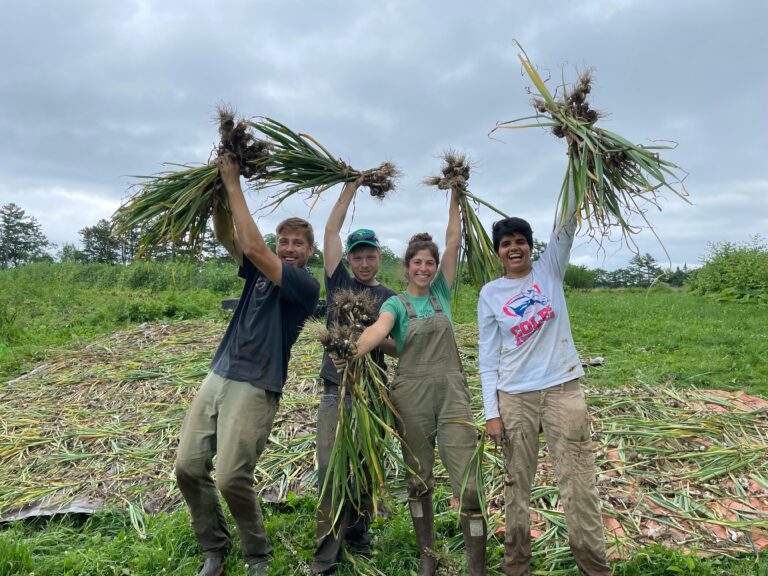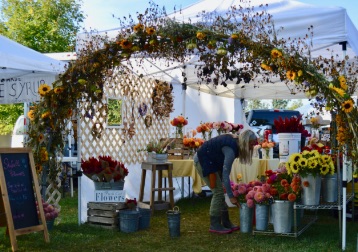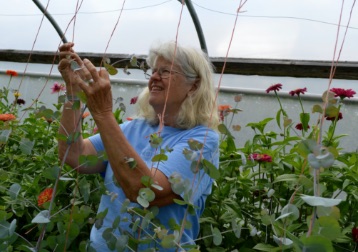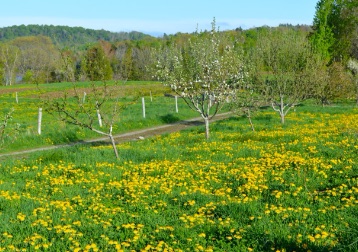Wolfe’s Neck Center for Agriculture and the Environment
FULL FOR THE 2024 SEASON! Wolfe’s Neck Farm is located right on the coast in Freeport, Maine. On 626 acres of diverse ecosystems, we farm, educate, conduct agricultural research, and invite visitors to engage with the food system and the role we all can play in building a more just and sustainable future.

Our apprenticeship runs from May 1 to Nov 1, and we hope that apprentices can stay the entire duration, but exceptions can be made.
Wolfe’s Neck Farm is located right on the coast in Freeport, Maine. We farm on the historic lands of the Abenaki people, members of the Wabanaki Confederation of Native people in Maine. On 626 acres of diverse ecosystems, we farm, educate, conduct agricultural research, and invite visitors to engage with the food system and the role we all can play in building a more just and sustainable future. We are only 25 minutes from Portland, 15 minutes from Brunswick, and less than 10 minutes from downtown Freeport. WNC has three miles of nature trails, a campground, and a great estuary to swim in. We sit right next to a state park full of great hiking trails.
Fruit & Vegetable Farming apprentices help care for 5.5 acres of MOFGA certified diversified fruit and vegetable production and collaborate with our educational programming. We are chemical-free, so we use no pesticides or herbicides, and we work to farm as ecologically as possible.
There is also a certified commercial kitchen on-site that is used for value-added canning production using our produce.
Yes, we are MOFGA certified, and we are also chemical-free.
This is a fantastic opportunity for aspiring farmers with little to no experience who are interested in farming, diversifying farm revenues through programming and value-added production, and agricultural education. Apprentices will learn the ins and outs of organic farming. Everything from crop planning, seeding, transplanting, cultivating, harvesting, preparing for market, marketing products, organizing a CSA, hands on equipment experience and much more! We also produce a value-added product line that apprentices will engage with (jams, pickles, tomato sauce). Since we have an environmental mission, apprentices may also have the chance to participate in cover cropping, soil sampling, and other on-farm initiatives. This experience is 70% production farming, 10% formal classroom sessions, 10% Value-Added/Canning production, 5% off-farm educational site visits.
Comfortability working with youth and the public. Strong work ethic, attention to detail, and ability to work quickly. Must work well with a team and be willing to work alone. Friendly and passionate about seasonal and sustainable food, must be able to lift at least 50lbs as heavy lifting is a daily practice. Ability and willingness to work in variable weather conditions outdoors during the summer. Valid driver’s license is required. Farm work can be extremely rewarding, but it also can be tedious, exhausting and frustrating. A good sense of humor and a positive outlook on life is always appreciated.
Apprentices are expected to be punctual, hard-working, courteous, kind and professional. Must have a passion for sustainable farming and interest/experience in sharing this passion through education. Labor will be physically demanding, and apprentices can expect to be squatting and lifting heavy objects depending on the project. While we will ask for some timing flexibility to account for weather and crop demands, we will adhere to 40 hour/5-day workweeks. Any changes or adjustments will be discussed with the crew ahead of time. A work plan will be reviewed during a weekly meeting, and there will be regular check-ins. Following training, apprentices will be expected to perform some tasks independently. Apprentices are expected to be comfortable performing on-farm tasks when managers are absent.
The apprenticeship is 70% production farming, 10% formal classroom sessions, 10% Value-Added/Canning production, and 5% off-farm educational site visits. We prioritize education, and most tasks are done as a group, especially in the first few months. We have classroom time at least twice a month where we will focus on different farm-related topics (pest management, season extension, orchard care and maintenance). We also have bi-weekly check-ins to make sure that apprentices learning goals are being met.
Yes, I work full-time at WNC farming and running this apprenticeship program.
Apprentices receive a $500 per week stipend, paid bi-weekly
Apprentices get 5 paid days off throughout the season in addition to state and federal holidays.
Additionally apprentices receive:
– Free fruits and vegetables.
– 25% discount for on-farm products (beef, pork, chicken, eggs).
– Free usage of bikes, kayaks, and canoes.
– Discounted oceanfront camping for friends and family (based on availability).
Yes, on farm. Many employees also live in Portland or Brunswick.
We recommend an on-farm visit if you are local but zoom works just as well!
We have bi-weekly check-ins to make sure that apprentices learning goals are being met. We have a written employee manual, an HR administrator, and all apprentices are familiarized with our organizational structure so they can seek assistance from any employee if needed.
I have been working on organic farms for nine years, including three apprenticeships in California, Vermont and finally settling in Maine. As someone who’s first exposure to organic agriculture was through an apprenticeship, I strive to nurture the curiosity and passion that I first experienced. Even with many growing seasons under my belt, I am still a student myself.
Outside of work, I still love to be surrounded by plants and fungi, and also watching soccer and various community organizing opportunities.
Wolfe’s Neck Center for Agriculture and the Environment supports a more equitable and just food system for all and works towards creating a more inclusive farm learning and working environment for beginning farmers that are historically and currently under-supported in agriculture. This includes but is not limited to women, people of color, LGBTQIA+ individuals, veterans, low-income individuals, people of diverse religious and non-religious affiliations, immigrants, and asylum seekers.
Education and Relationship building: As an educational nonprofit, one of Wolfe’s Neck Center’s primary goals is to train the next generation of food systems leaders and new farmers. Our classroom curriculum reflects this, as well as collaboration with our Education team and MOFGA apprentice programming
Equity and inclusivity: WNC is committed to training new farmers and working towards increased inclusivity in the agricultural community so that people of every race, ethnicity, faith, gender identity, and economic circumstance are supported and celebrated.
Environmental sustainability: WNC’s agricultural approach of utilizing the techniques of “regenerative agriculture” uses traditional practices implemented by indigenous peoples who have stewarded the earth for millennia, as well as from other farming traditions that seek to cultivate food in ecological balance.
Safe and fair: Our apprenticeship is meant to model the daily ins-and-outs of small-scale market farming. First and foremost this includes proper training and guidance in safe practices, and in a supportive and respectful working environment. Though we work in all weather conditions, apprentices can expect their safety and physical needs to be attended to.
Hannah Johnson, [email protected], 207-572-2749
Former apprentice reference
Nathaniel Maddix [email protected], 207-475-5848
Former apprentice reference
Personal reference



Wolfe’s Neck Center for Agriculture and the Environment
- Physical Address
- 184 Burnett Rd, Freeport, ME 04032
- Phone
- 650-799-9048

